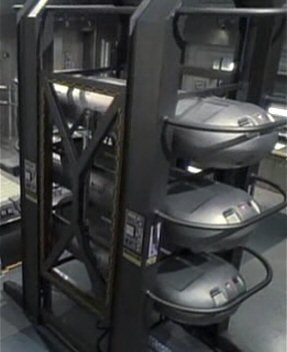Difference between revisions of "Photonic torpedo"
Jump to navigation
Jump to search
| Line 1: | Line 1: | ||
[[Image:Photonic torpedoes.jpg|thumb|right|Photonic torpedoes in storage]] | [[Image:Photonic torpedoes.jpg|thumb|right|Photonic torpedoes in storage]] | ||
'''Photonic torpedoes''' are missile weapons used on Earth starships in the 22nd century. They are essentially low-performance [[photon torpedo]]es<ref>''[[Star Trek: Enterprise]]''</ref>. Like their descendants, they have variable explosive yield. According to [[Malcolm Reed]], a maximum-yield photonic torpedo can "put a 3-kilometer crater into an asteroid,"<ref>ENT "The Expanse"</ref> suggesting a high yield of | '''Photonic torpedoes''' are missile weapons used on Earth starships in the 22nd century. They are essentially low-performance [[photon torpedo]]es<ref>''[[Star Trek: Enterprise]]''</ref>. Like their descendants, they have variable explosive yield. According to [[Malcolm Reed]], a maximum-yield photonic torpedo can "put a 3-kilometer crater into an asteroid,"<ref>ENT "The Expanse"</ref> suggesting a high yield of between 1.3 megatons (mostly water ice), 5 megatons (granite composition), or 127 megatons (nickle-iron composition). The mean average of these estimates is 44.4 megatons. <ref>[http://www.stardestroyer.net/Empire/Science/Asteroids.html Stardestroyer.net Asteroid Destruction Calculator]</ref> | ||
==References== | ==References== | ||
Revision as of 14:33, 2 May 2014
Photonic torpedoes are missile weapons used on Earth starships in the 22nd century. They are essentially low-performance photon torpedoes[1]. Like their descendants, they have variable explosive yield. According to Malcolm Reed, a maximum-yield photonic torpedo can "put a 3-kilometer crater into an asteroid,"[2] suggesting a high yield of between 1.3 megatons (mostly water ice), 5 megatons (granite composition), or 127 megatons (nickle-iron composition). The mean average of these estimates is 44.4 megatons. [3]
References
- ↑ Star Trek: Enterprise
- ↑ ENT "The Expanse"
- ↑ Stardestroyer.net Asteroid Destruction Calculator
